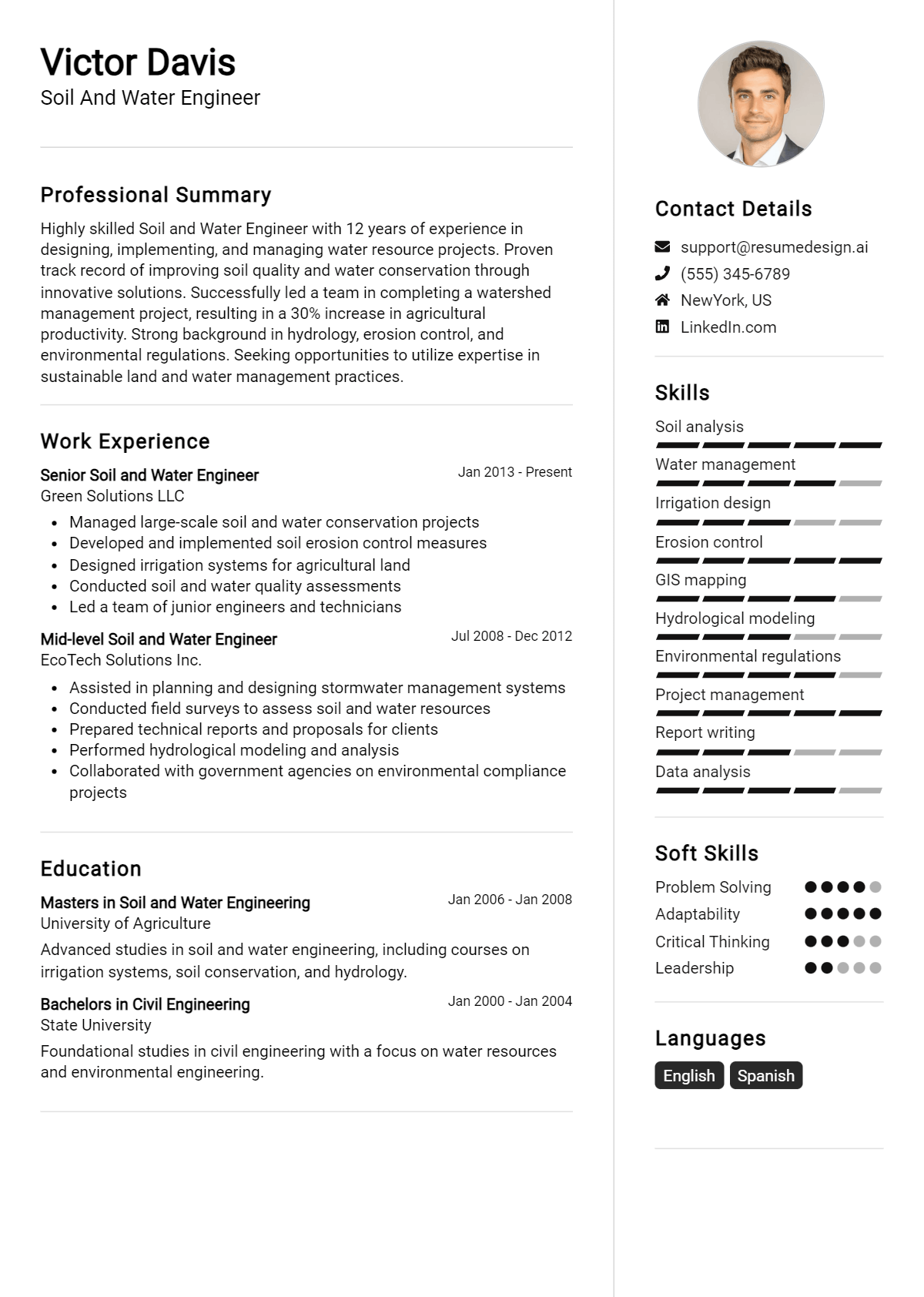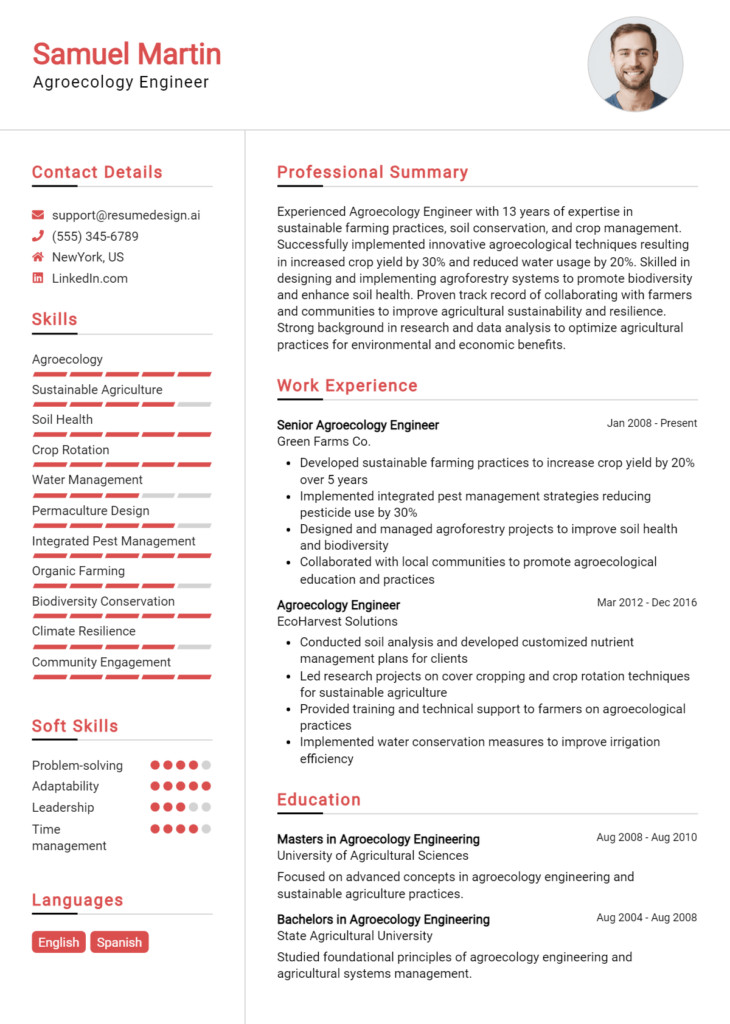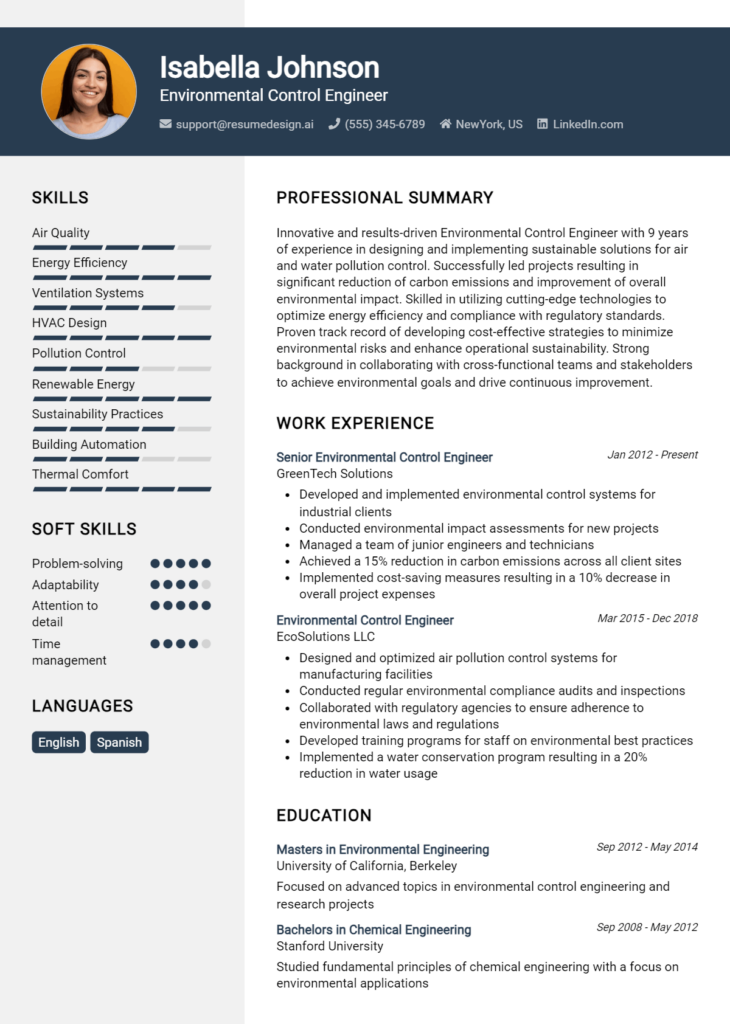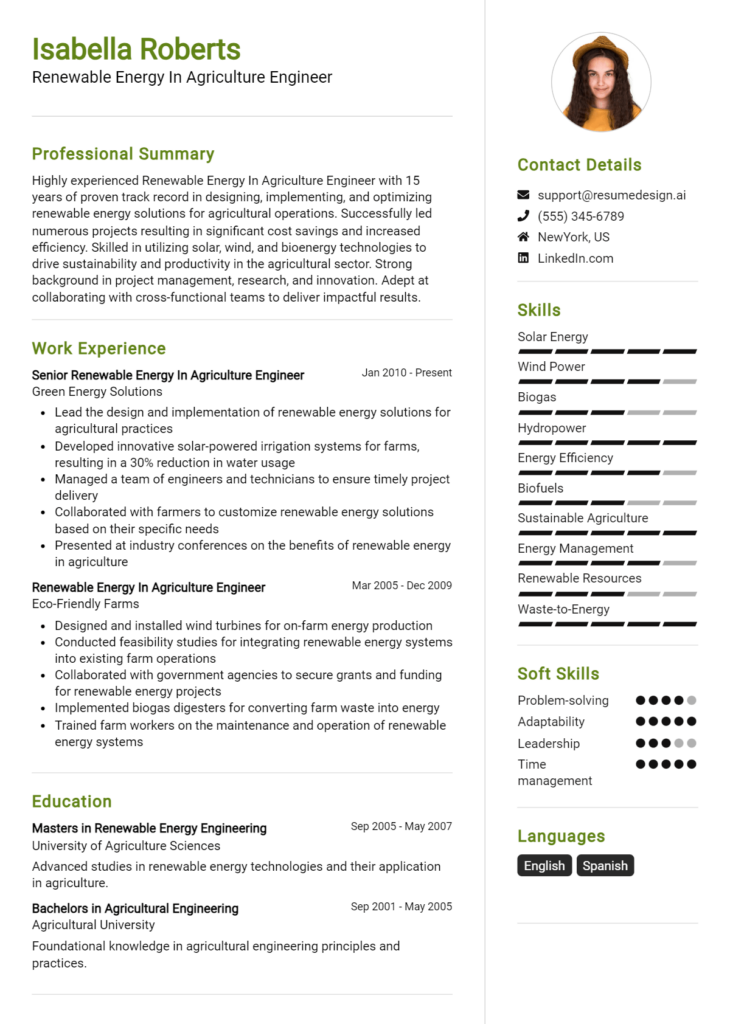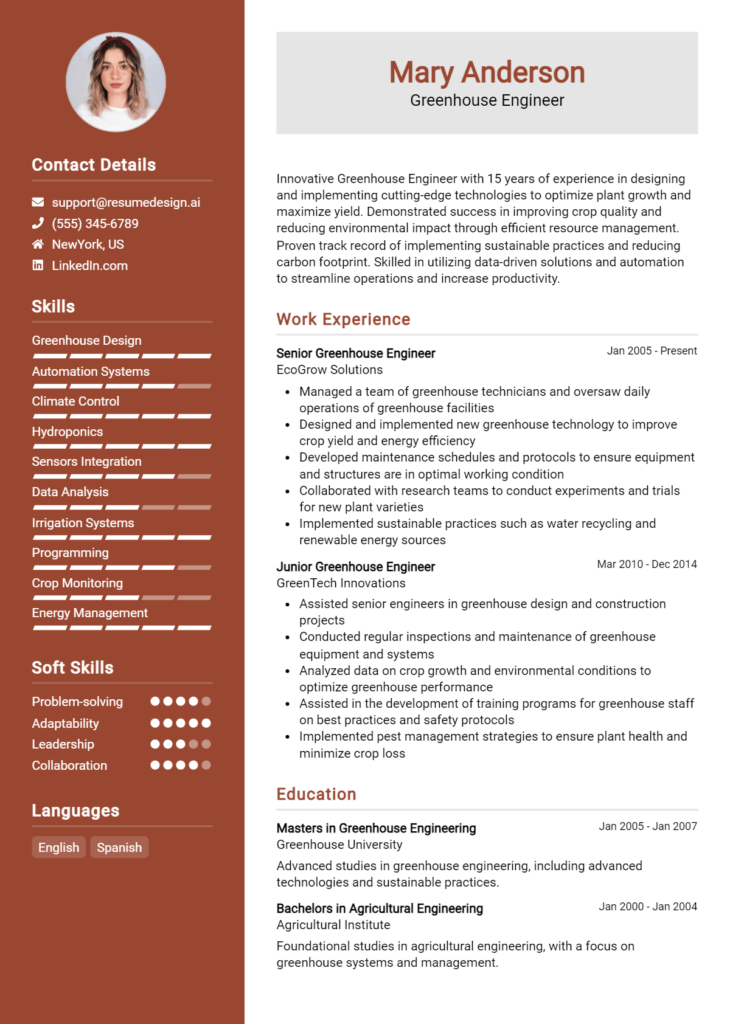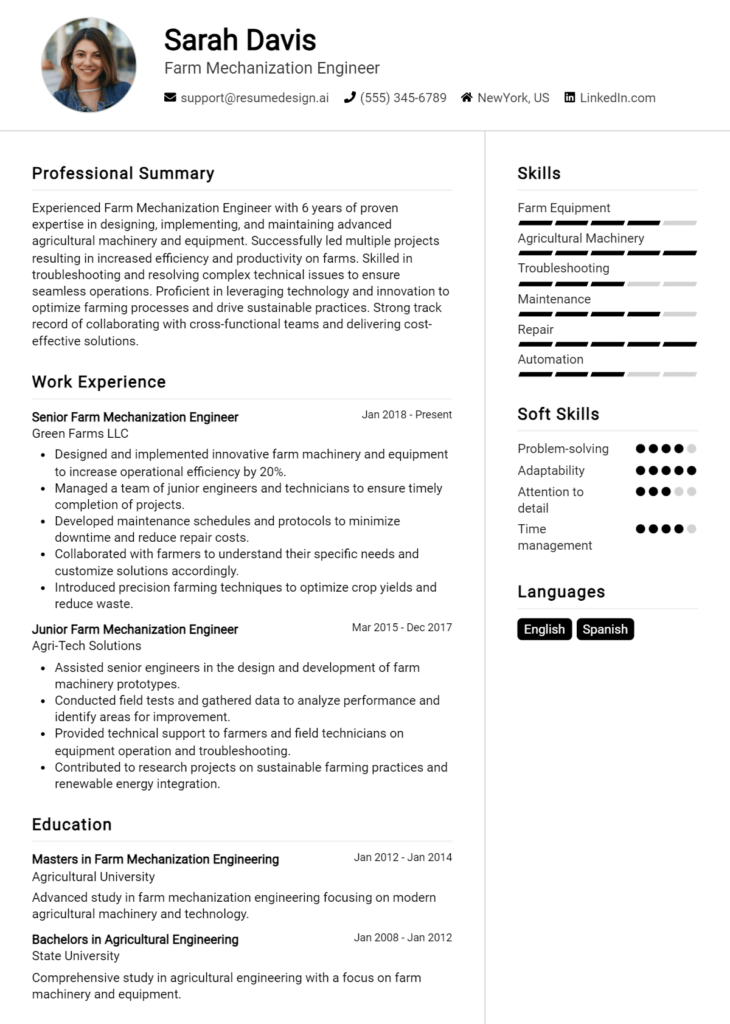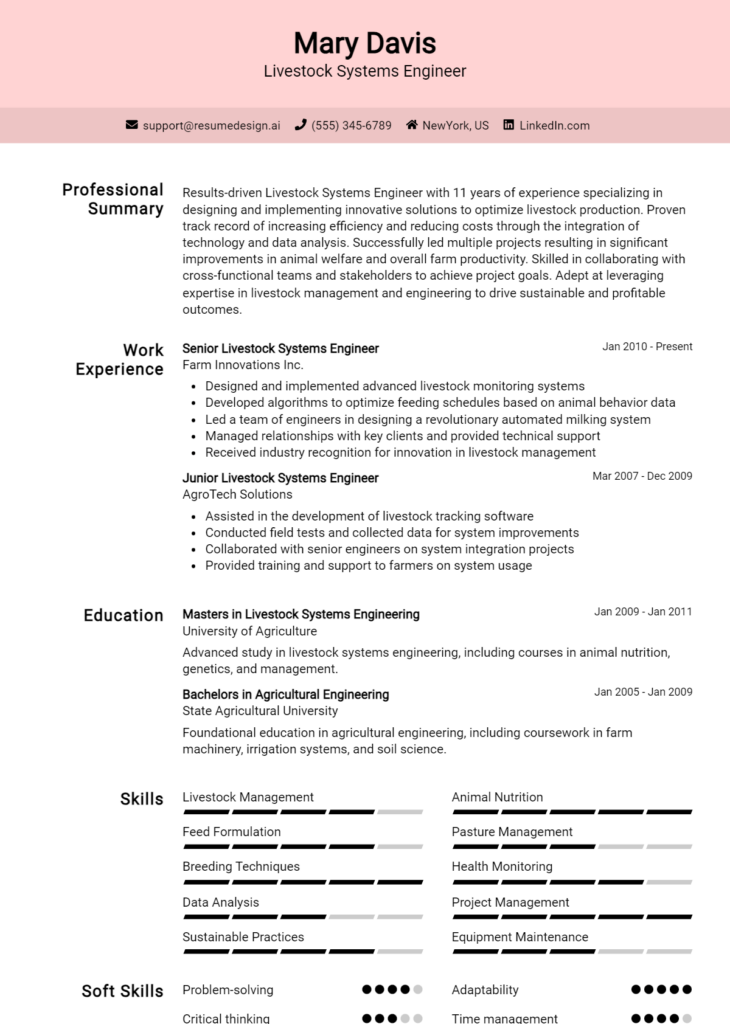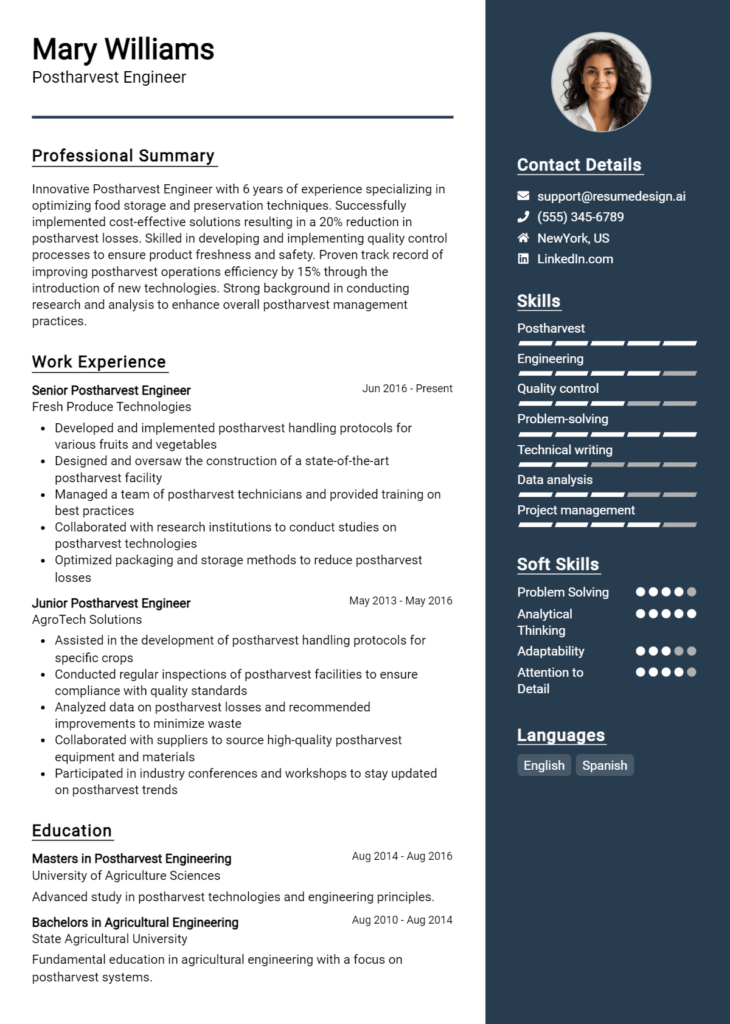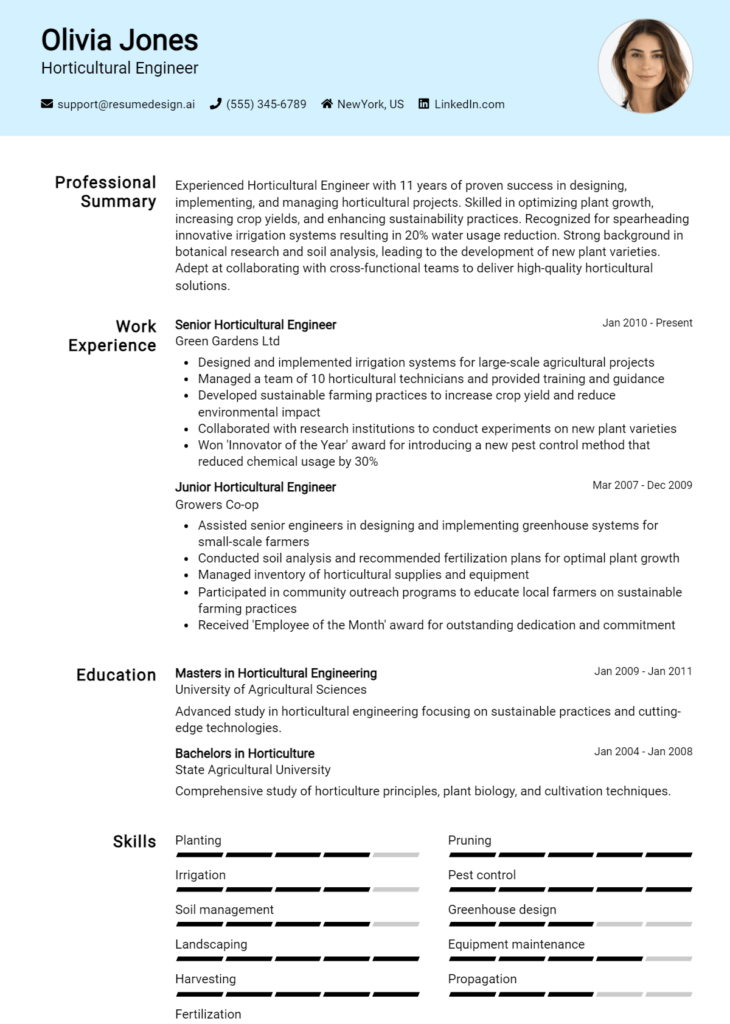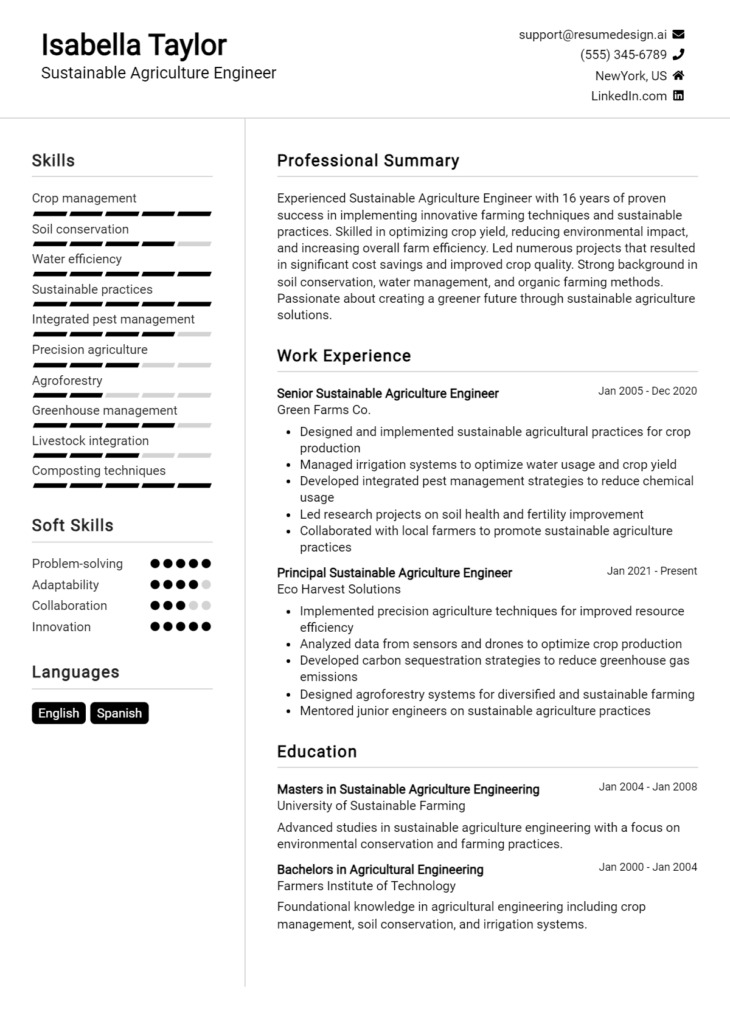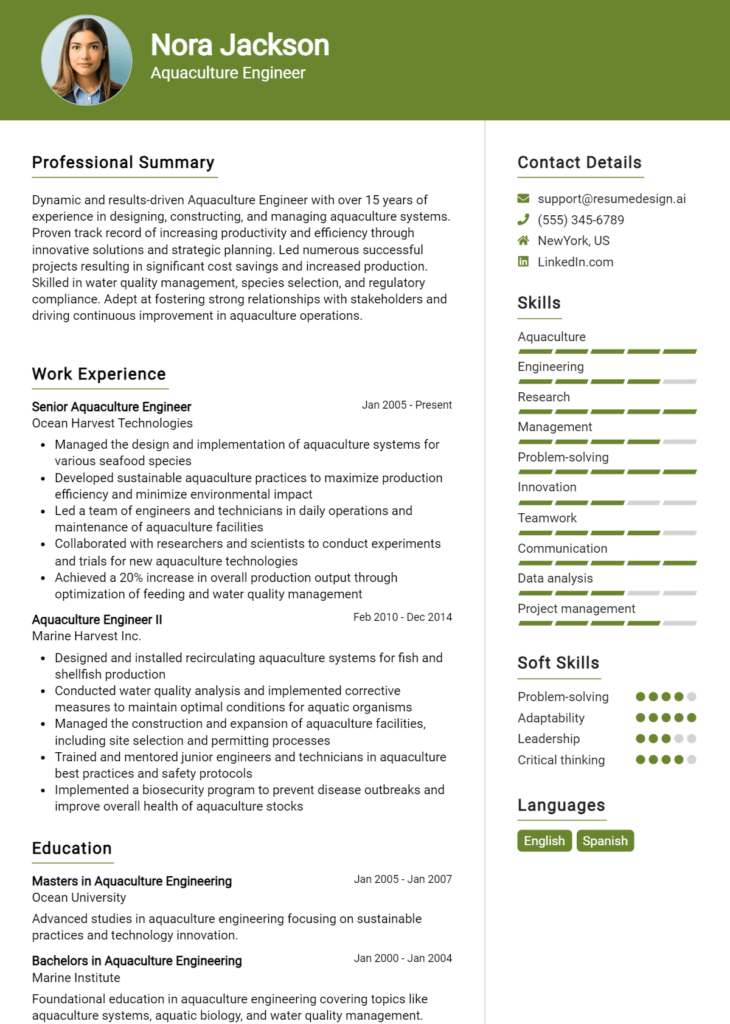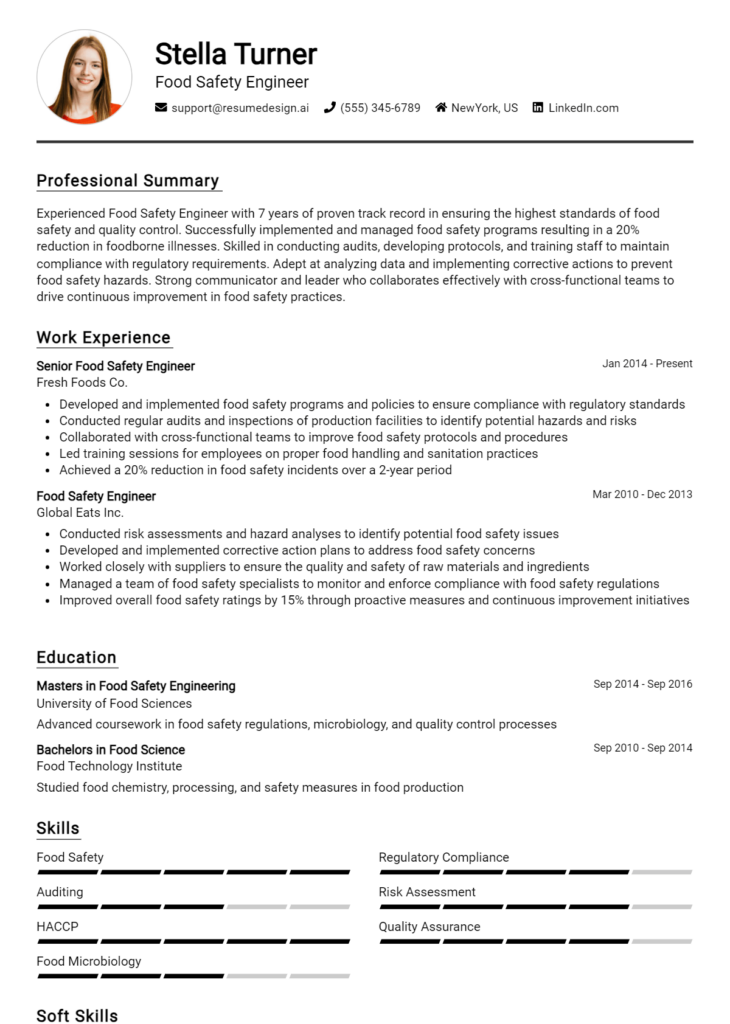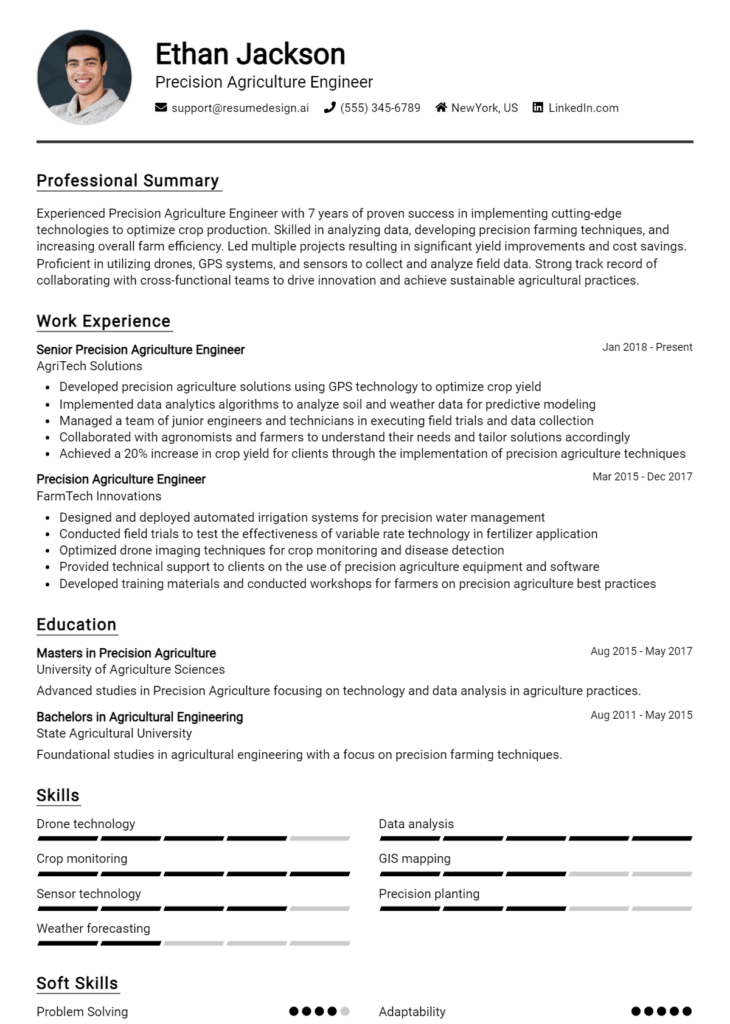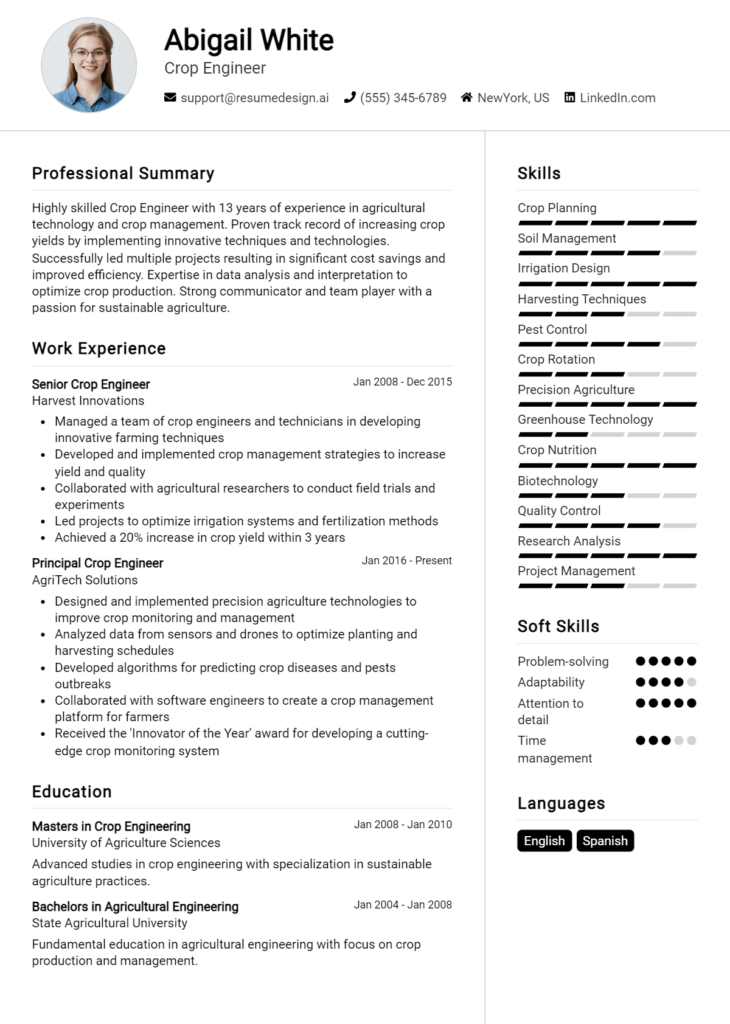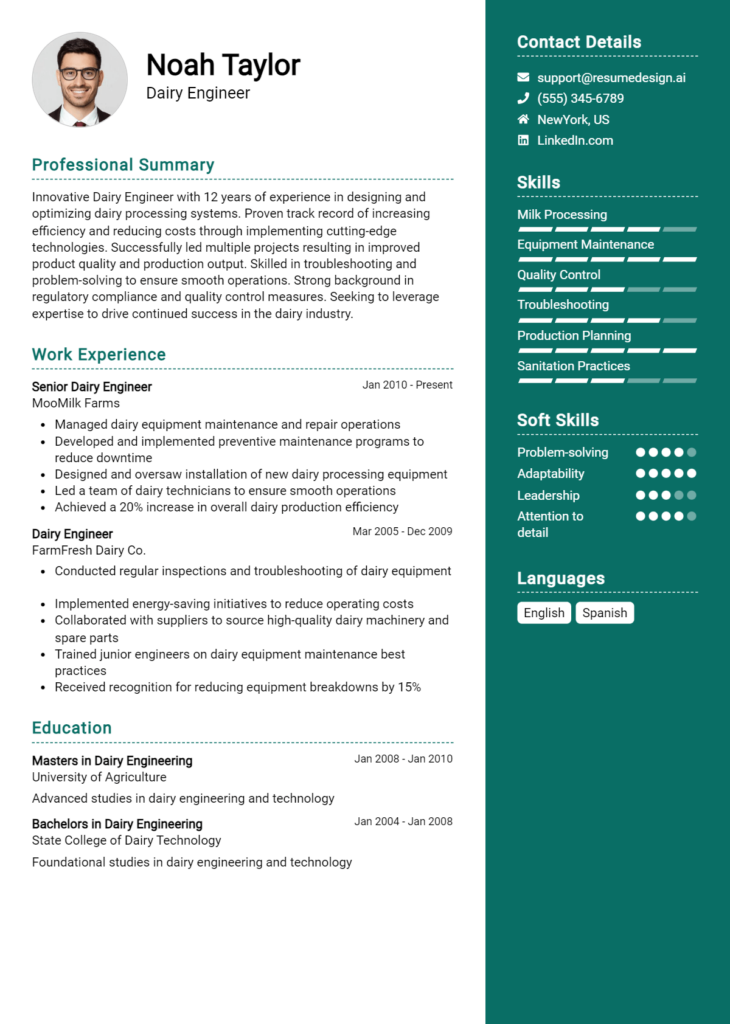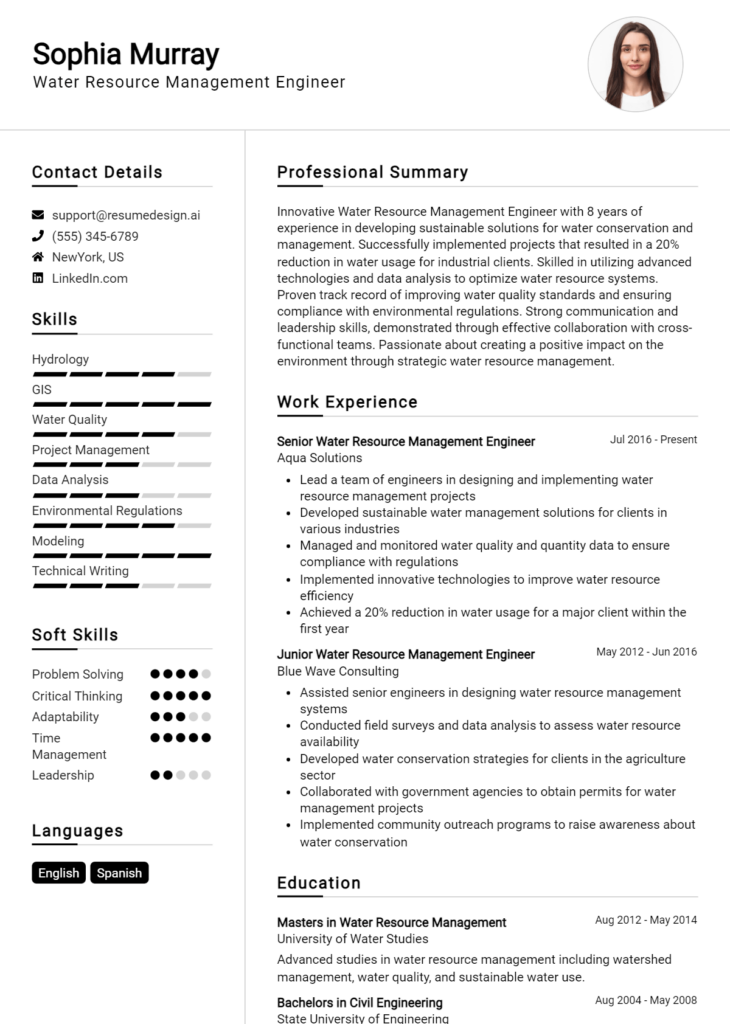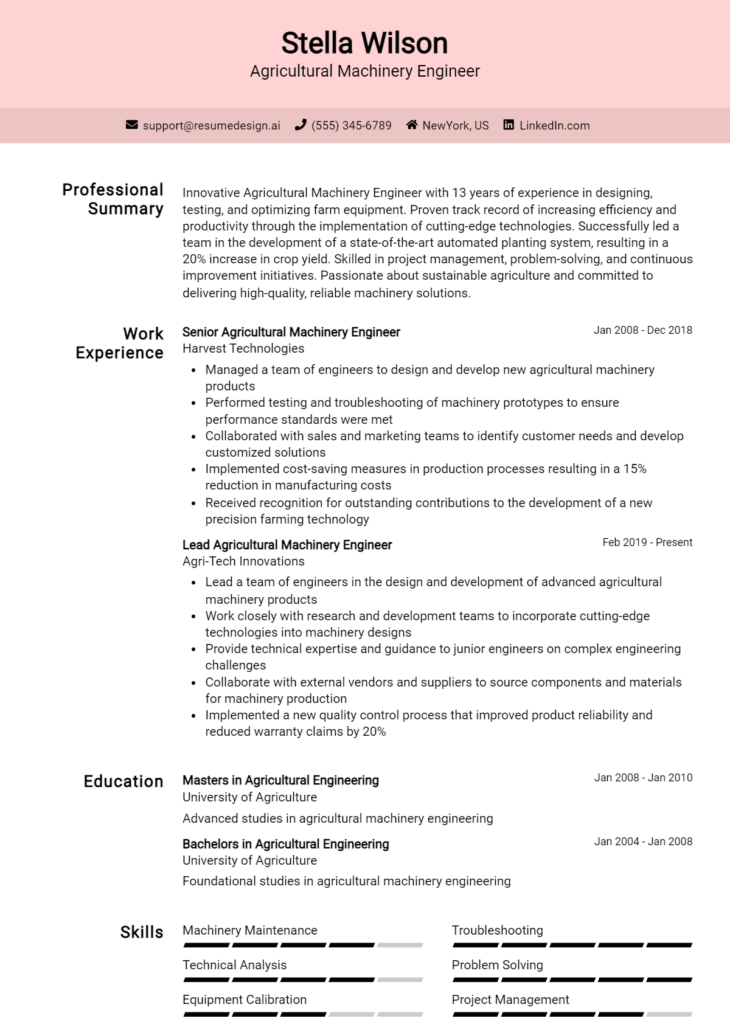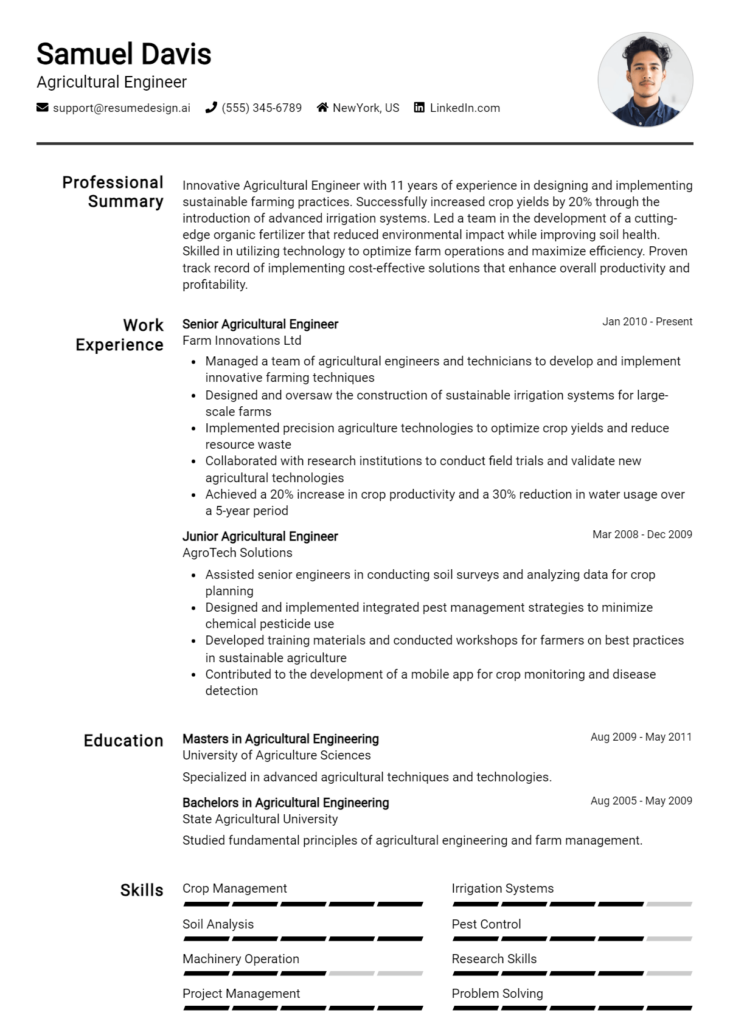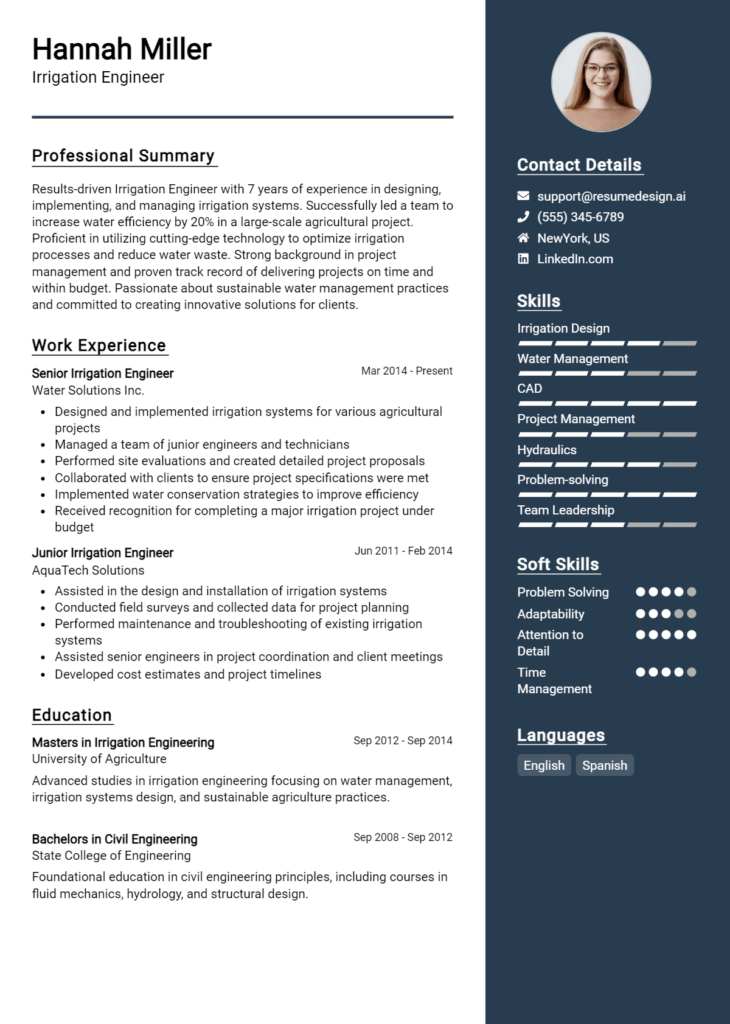Soil and Water Engineer Core Responsibilities
A Soil and Water Engineer plays a crucial role in managing and conserving natural resources by integrating engineering principles with environmental science. Key responsibilities include designing sustainable water management systems, conducting soil assessments, and implementing erosion control measures. This role requires strong technical, operational, and problem-solving skills to collaborate effectively with various departments, such as environmental, construction, and regulatory compliance teams. A well-structured resume that highlights these qualifications is essential for showcasing the engineer's contribution to the organization's sustainability goals.
Common Responsibilities Listed on Soil and Water Engineer Resume
- Design and implement soil and water conservation projects.
- Conduct hydrological and hydraulic analyses to support project planning.
- Evaluate soil and water quality through field investigations and sampling.
- Develop and enforce environmental regulations and compliance measures.
- Collaborate with multidisciplinary teams on sustainable land use practices.
- Prepare technical reports and presentations for stakeholders.
- Monitor and assess the effectiveness of implemented systems.
- Provide guidance on irrigation and drainage systems.
- Utilize GIS and modeling software for data analysis.
- Conduct risk assessments related to soil erosion and water contamination.
- Participate in community outreach and education initiatives.
High-Level Resume Tips for Soil and Water Engineer Professionals
In the highly specialized field of Soil and Water Engineering, a well-crafted resume is not just a document; it is your first opportunity to make a lasting impression on potential employers. This initial representation of your professional identity needs to effectively reflect your unique skills, relevant experiences, and notable achievements in the industry. A strong resume can set you apart from the competition, showcasing your ability to tackle complex engineering challenges related to soil conservation, water management, and environmental sustainability. In this guide, we will provide practical and actionable resume tips specifically tailored for Soil and Water Engineer professionals, ensuring you present your qualifications in the best light possible.
Top Resume Tips for Soil and Water Engineer Professionals
- Tailor your resume to the specific job description by incorporating relevant keywords and phrases that align with the employer's needs.
- Highlight your educational background, including degrees in civil engineering, environmental engineering, or related fields, along with any relevant certifications.
- Showcase your experience with specific projects or case studies that demonstrate your expertise in soil and water management.
- Quantify your achievements by using metrics and data to illustrate the impact of your work, such as improvements in water quality or soil erosion rates.
- Include industry-specific skills like hydrological modeling, GIS applications, and environmental impact assessments that are essential for Soil and Water Engineers.
- Emphasize your collaboration with multidisciplinary teams, showcasing your ability to work with ecologists, planners, and other engineers.
- Incorporate any relevant software proficiencies, such as AutoCAD, HEC-RAS, or other engineering simulation tools that enhance your technical capabilities.
- Utilize a clean and professional format that enhances readability and allows hiring managers to quickly identify your key qualifications.
- Consider adding a summary statement at the top of your resume that encapsulates your career highlights and sets the stage for your qualifications.
By implementing these tips, you can significantly increase your chances of landing a job in the competitive field of Soil and Water Engineering. A well-structured resume that highlights your relevant skills and achievements not only captures the attention of hiring managers but also demonstrates your commitment to the profession and your readiness to contribute to sustainable engineering solutions.
Why Resume Headlines & Titles are Important for Soil and Water Engineer
In the competitive field of soil and water engineering, a well-crafted resume headline or title is crucial for capturing the attention of hiring managers. This concise phrase serves as a first impression, summarizing a candidate's key qualifications and expertise in an impactful way. A strong headline not only highlights relevant skills but also sets the tone for the rest of the resume, making it easier for recruiters to identify the candidate’s suitability for the position at a glance. Therefore, it is essential that the headline is concise, relevant, and directly aligned with the job being applied for, ensuring it resonates with the specific requirements of the role.
Best Practices for Crafting Resume Headlines for Soil and Water Engineer
- Keep it concise: Limit the headline to one impactful phrase.
- Be specific: Use terminology that reflects the soil and water engineering field.
- Highlight key qualifications: Focus on your most relevant skills or achievements.
- Use strong action words: Begin with dynamic verbs that convey expertise.
- Align with job description: Tailor the headline to reflect the specific role you’re applying for.
- Include relevant certifications or specialties: Mention any pertinent credentials that set you apart.
- Avoid jargon: Ensure the language is easily understandable by hiring managers.
- Make it engaging: Use language that conveys enthusiasm and readiness for the role.
Example Resume Headlines for Soil and Water Engineer
Strong Resume Headlines
Innovative Soil and Water Engineer with 5+ Years in Sustainable Design Solutions
Expert in Hydrology and Soil Mechanics with Proven Project Management Skills
Dedicated Soil and Water Engineer Specializing in Environmental Restoration Projects
Results-Driven Engineer with Advanced Knowledge in Irrigation Systems and Water Conservation
Weak Resume Headlines
Engineer Looking for Opportunities
Soil and Water Engineer
Experienced Professional
The strong resume headlines are effective because they highlight specific skills and experiences that directly relate to the field of soil and water engineering, making them memorable and relevant to hiring managers. They convey a sense of expertise and enthusiasm, which can differentiate a candidate from others. Conversely, the weak headlines fail to impress as they are vague and generic, lacking the specificity and impact necessary to attract attention. Without a clear focus or indication of relevant experience, these headlines do not provide any compelling reason for hiring managers to consider the candidates further.
Writing an Exceptional Soil and Water Engineer Resume Summary
A well-crafted resume summary is crucial for a Soil and Water Engineer, as it serves as the first impression for hiring managers who sift through numerous applications. This brief but impactful section succinctly highlights a candidate's key skills, relevant experience, and notable accomplishments, making it easier for employers to quickly gauge their suitability for the role. A strong summary should be concise, focus on the most pertinent qualifications, and be tailored specifically to the job description, setting the tone for the rest of the resume.
Best Practices for Writing a Soil and Water Engineer Resume Summary
- Quantify achievements: Use specific numbers to demonstrate the impact of your work, such as "reduced water loss by 30%."
- Focus on relevant skills: Highlight key technical skills, such as hydrological modeling or soil conservation techniques, that match the job description.
- Tailor the summary: Customize your summary for each job application to reflect the specific requirements and responsibilities of the role.
- Use action verbs: Start sentences with strong action verbs to convey a sense of proactivity and accomplishment.
- Keep it concise: Aim for 2-4 sentences that capture your qualifications without overwhelming the reader.
- Showcase certifications: Mention relevant certifications or licenses that enhance your credibility as a Soil and Water Engineer.
- Incorporate industry terminology: Use specific jargon and terms that reflect your expertise in soil and water engineering.
- Maintain a professional tone: Ensure that the language is formal and aligns with the expectations of the engineering profession.
Example Soil and Water Engineer Resume Summaries
Strong Resume Summaries
Detail-oriented Soil and Water Engineer with over 8 years of experience in hydrological modeling and watershed management. Successfully led a project that improved irrigation efficiency by 40%, resulting in a cost savings of $150,000 annually for agricultural clients.
Innovative Soil and Water Engineer possessing a Master’s degree in Environmental Engineering and 5 years of experience in soil conservation practices. Developed a sustainable drainage system that decreased flood risks by 25% in urban areas, enhancing community resilience.
Results-driven Soil and Water Engineer with extensive expertise in water resource management and soil remediation. Spearheaded a soil assessment initiative that identified contamination sources, leading to a 60% reduction in pollutants in local water bodies.
Weak Resume Summaries
Soil and Water Engineer with some experience looking for a job. I have worked on various projects and have a degree in engineering.
Dedicated professional in soil and water engineering. I have skills in project management and want to contribute to a team.
The strong resume summaries stand out due to their use of quantifiable results, specific skills, and direct relevance to the Soil and Water Engineer role, making them compelling and memorable. In contrast, the weak summaries lack detail and specificity, failing to provide any measurable outcomes or insights into the candidate's qualifications, which diminishes their impact on hiring managers.
Work Experience Section for Soil and Water Engineer Resume
The work experience section of a Soil and Water Engineer resume is a critical component that reflects the candidate's technical expertise, project management capabilities, and ability to deliver high-quality solutions. This section not only highlights the specific skills acquired through hands-on experience but also demonstrates the candidate's proficiency in leading teams and executing complex projects. By quantifying achievements and aligning experiences with industry standards, candidates can effectively showcase their contributions to significant environmental improvements and sustainable practices, making them more appealing to potential employers.
Best Practices for Soil and Water Engineer Work Experience
- Use specific metrics to quantify your achievements (e.g., "reduced soil erosion by 30%").
- Highlight technical skills relevant to soil and water engineering, including software proficiency and analytical techniques.
- Demonstrate leadership abilities by detailing team projects and management roles.
- Include examples of successful collaborations with stakeholders, such as government agencies or environmental organizations.
- Align your experiences with current industry standards and best practices.
- Focus on outcomes that had a significant impact on project success and sustainability.
- Use action verbs to start each bullet point, making your contributions clear and dynamic.
- Tailor your experiences to the job description to emphasize relevant skills and accomplishments.
Example Work Experiences for Soil and Water Engineer
Strong Experiences
- Led a team of engineers in a project that implemented a new irrigation system, resulting in a 25% increase in crop yields for over 150 acres of farmland.
- Developed a comprehensive water management plan that reduced water consumption by 40% for a major agricultural client, saving $100,000 annually.
- Collaborated with local government to design and execute a flood mitigation project that protected 500 homes, improving community resilience to extreme weather events.
- Utilized advanced modeling software to assess soil stability, leading to the successful completion of a critical infrastructure project three months ahead of schedule.
Weak Experiences
- Worked on various projects related to soil and water.
- Assisted in the management of a team.
- Helped with the implementation of environmental strategies.
- Participated in meetings with stakeholders about project updates.
The examples provided highlight the difference between strong and weak experiences. Strong experiences are characterized by specific, quantifiable outcomes, clear leadership roles, and impactful collaboration, showcasing the candidate's abilities in a measurable way. In contrast, weak experiences lack detail, specificity, and demonstrable achievements, making them less compelling to potential employers. By focusing on concrete results and relevant skills, candidates can significantly enhance the effectiveness of their work experience section.
Education and Certifications Section for Soil and Water Engineer Resume
The education and certifications section of a Soil and Water Engineer's resume plays a crucial role in establishing the candidate's qualifications and expertise in the field. This section not only showcases the academic background that forms the foundation of the engineer's knowledge but also highlights industry-relevant certifications and ongoing learning efforts that demonstrate commitment to professional development. By including relevant coursework, specialized training, and recognized credentials, candidates can significantly enhance their credibility, making them more aligned with the job requirements and appealing to potential employers.
Best Practices for Soil and Water Engineer Education and Certifications
- Prioritize relevant degrees in environmental science, civil engineering, or agricultural engineering.
- Include industry-recognized certifications such as Professional Engineer (PE) or Certified Professional in Erosion and Sediment Control (CPESC).
- Highlight specialized training that pertains to modern soil and water management techniques.
- List relevant coursework that demonstrates knowledge of hydrology, soil mechanics, and water resource management.
- Keep descriptions concise but detailed enough to convey the significance of each qualification.
- Update the section regularly to reflect new certifications or educational advancements.
- Use bullet points for clarity and easy readability, ensuring important details stand out.
- Consider including honors or awards received during academic or certification pursuits to further build credibility.
Example Education and Certifications for Soil and Water Engineer
Strong Examples
- Bachelor of Science in Civil Engineering, University of ABC, May 2022
- Master of Science in Environmental Engineering, University of XYZ, December 2023
- Certified Professional in Erosion and Sediment Control (CPESC), 2023
- Relevant Coursework: Hydrology, Soil Mechanics, Water Resource Management, and Environmental Impact Assessment
Weak Examples
- Bachelor of Arts in History, University of DEF, May 2020
- Certification in Basic First Aid, Red Cross, 2022
- Online Course: Introduction to Gardening, 2021
- High School Diploma, Anytown High School, 2018
The strong examples listed are considered effective because they directly relate to the qualifications and skills required for a Soil and Water Engineer, showcasing a relevant academic background and recognized certifications that indicate a commitment to the field. In contrast, the weak examples reflect irrelevant educational qualifications and certifications that do not pertain to the technical and specialized nature of soil and water engineering, thereby failing to support the candidate's suitability for the role.
Top Skills & Keywords for Soil and Water Engineer Resume
As a Soil and Water Engineer, developing a resume that effectively showcases your skills is crucial for capturing the attention of potential employers. The right combination of hard and soft skills can make a significant difference in demonstrating your expertise and suitability for the role. Employers look for candidates who not only possess technical knowledge but also have the ability to communicate, collaborate, and solve problems effectively. Highlighting your unique skills can help you stand out in a competitive job market and demonstrate your capability to contribute to sustainable water and soil management practices.
Top Hard & Soft Skills for Soil and Water Engineer
Soft Skills
- Communication
- Teamwork
- Problem-solving
- Adaptability
- Critical thinking
- Time management
- Attention to detail
- Project management
- Interpersonal skills
- Leadership
Hard Skills
- Soil analysis and testing
- Hydrology and hydraulics
- Geographic Information Systems (GIS)
- Environmental regulations and compliance
- AutoCAD and design software
- Data analysis and modeling
- Irrigation systems design
- Erosion control techniques
- Water quality assessment
- Remote sensing technology
To enhance your skills and effectively present your work experience, ensure that you integrate these key elements into your resume to increase your chances of securing a desirable position in the field of soil and water engineering.
Stand Out with a Winning Soil and Water Engineer Cover Letter
I am writing to express my interest in the Soil and Water Engineer position at [Company Name], as advertised on [where you found the job posting]. With a Master’s degree in Environmental Engineering and over five years of experience specializing in soil and water conservation projects, I am confident in my ability to contribute effectively to your team. My background in hydrological modeling, soil analysis, and watershed management has equipped me with the skills necessary to tackle complex environmental challenges while promoting sustainable practices.
In my previous role at [Previous Company Name], I successfully led a team in the design and implementation of innovative drainage systems that reduced soil erosion by 30% while enhancing groundwater recharge in the region. My hands-on experience with various soil and water assessment tools allowed me to conduct comprehensive site evaluations, ensuring compliance with environmental regulations and improving land use efficiency. I am particularly proud of my collaboration with local stakeholders, which facilitated community engagement and fostered a shared commitment to sustainable land and water management.
I am particularly drawn to the mission of [Company Name] to promote environmental sustainability and innovation in engineering practices. I am eager to bring my technical expertise, problem-solving skills, and passion for environmental stewardship to your organization. I believe that my proactive approach to project management and my ability to communicate complex concepts to diverse audiences will allow me to make a meaningful contribution to your team.
Thank you for considering my application. I look forward to the opportunity to discuss how my skills and experiences align with the goals of [Company Name]. I am excited about the possibility of working together to create sustainable solutions for soil and water management challenges.
Common Mistakes to Avoid in a Soil and Water Engineer Resume
When crafting a resume for a Soil and Water Engineer position, it's essential to present your skills and experiences effectively. However, many candidates make common mistakes that can hinder their chances of standing out to potential employers. By avoiding these pitfalls, you can create a compelling resume that highlights your qualifications and aligns with the job requirements.
Lack of Specificity: Failing to provide detailed descriptions of your projects and responsibilities can make your experience seem vague. Always include specific examples of your work with soil and water management.
Ignoring Keywords: Not incorporating industry-specific keywords from the job description can lead to your resume being filtered out by applicant tracking systems (ATS). Ensure you use relevant terminology throughout your document.
Overloading with Technical Jargon: While technical knowledge is crucial, using too much jargon can confuse hiring managers. Aim for a balance between demonstrating expertise and maintaining clarity.
Neglecting Soft Skills: Focusing solely on technical skills can overlook the importance of soft skills such as communication, teamwork, and problem-solving, which are vital in collaborative engineering environments.
Unorganized Formatting: A cluttered or inconsistent format can detract from the professionalism of your resume. Use clear headings, bullet points, and a clean layout to improve readability.
Failing to Quantify Achievements: Not providing quantifiable results for your accomplishments can weaken your impact. Whenever possible, use numbers to demonstrate the success of your projects (e.g., “reduced water usage by 20%”).
Lack of Customization: Sending out a generic resume can show a lack of interest in the specific position. Tailor your resume for each application to reflect how your skills match the job requirements.
Outdated Information: Including old or irrelevant experiences can clutter your resume and distract from your most pertinent qualifications. Ensure that only the most recent and relevant information is included.
Conclusion
As a Soil and Water Engineer, your role is critical in managing and conserving our precious natural resources. Throughout this article, we explored the essential skills and qualifications needed for this position, including expertise in hydrology, soil science, and environmental regulations. We also discussed the importance of utilizing advanced technology and sustainable practices to address challenges such as erosion, water quality, and resource management.
In conclusion, if you're looking to advance your career as a Soil and Water Engineer or land your dream job, it's essential to have a polished and professional resume that highlights your unique skills and experiences. We encourage you to take the time to review and update your resume to ensure it stands out to potential employers.
To assist you in this process, a variety of resources are available. You can explore resume templates to find the perfect design for your qualifications. Consider using a resume builder to create a tailored document that effectively showcases your strengths. Additionally, check out resume examples for inspiration on how to structure your content and make a lasting impression. Finally, don't forget about the importance of a strong first impression with a well-crafted cover letter; browse our selection of cover letter templates to get started.
Take the next step in your career journey today by refining your resume and ensuring you're ready to seize new opportunities in the exciting field of soil and water engineering!

